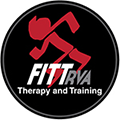Frequently Asked Questions
FREE Functional Evaluation for NEW Patients
FAQs About FITTrva & DNS
Here are some of the most common questions we get about our treatment methods and our practice.
What is DNS?
Dynamic Neuromuscular Stabilization is based on Developmental Kinesiology (DK), which is the study of the neurophysiological aspects of the locomotor system as the child matures from birth to 4 years of age.
DNS includes a DK knowledge and theoretical base as well as a comprehensive approach to assessment, treatment, exercise, and functional strategies that all respect the principles of Developmental Kinesiology. This approach includes manual therapy developed by Prof. Karel Lewit, M.D., evaluation and treatment of muscle imbalances and sensory deficits according to Prof. Vladimir Janda, M.D., and Reflex Locomotion according to Prof. Vaclav Vojta M.D.
The individual aspects were combined in an efficient and exciting way by Prof. Pavel Kolar PaedDr., Ph.D. to become what we today call Dynamic Neuromuscular Stabilization. This is an innovative approach to manual medicine (chiropractic) and physiotherapy which involves every component of the locomotor centers in the brain through activation of ideal inborn movement stereotypes. Please refer to our “What is DNS” page for further information.
What Is Developmental Kinesiology?
In DNS we study in great detail the anticipated movements and patterns of stability and locomotion at landmarks in childhood development. Healthy babies develop these patterns in a predictable and consistent fashion corresponding to the month of development.
Example: about 4.5 months of age, a healthy baby lying on his/her back can reach across the midline with one upper extremity, while the other upper extremity begins to support the baby so he/she can turn towards that (supported) side. Those movements begin as reflexive movements (based on the genetic code), in the same (predictable) way and at the same stage of development for all healthy babies. And thus, a baby isn’t taught to turn but, rather, “learns” how to turn automatically.
Can any age group be treated with the DNS approach?
Yes. At FITT RVA we have treated patients from newborns to men and women in their eighties and nineties. All you need is a nervous system and a willingness to make an effort.
What is the Functional Evaluation?
FE is a series of tests that challenge different aspects of the locomotor system. It involves simple movements (ex. “Lift your knee”, put your chin on your chest”, etc.) that illustrate how your body moves, and how it controls the movement. By comparing that with the “ideal” movement pattern (which is derived from a normal developing baby), we can isolate the “key link” in the “movement chain that is a dysfunction”. This forms the basis for correcting the problem so that the pattern can be changed (in the brain) with therapy and /or exercise.
Can someone who has had surgery get DNS treatment?
Yes. Many of our patients have had surgery but continue to have a problem after the surgery, either at the site of the surgery or some other place else in the body. Our therapy is intended to correct the dysfunction where it exists and then integrate that correction into the rest of the locomotor system. That way, the underlying weakness that caused the problem, is the first place, can be addressed.
Is it okay to come and get treated if I’m pregnant?
Yes. At Capitol Rehab, we employ many different techniques and procedures, all under the “umbrella” of the DNS approach. Some techniques are appropriate for pregnant women and some may need to altered for the patient’s comfort. Dr. Mayer has treated many pregnant women over the past thirty plus years, many which were referred by their obstetrician. If Dr. Mayer thinks therapy is contraindicated in a particular case, he will tell you so and make recommendations accordingly.
What conditions does DNS help with?
DNS is an approach to physical therapy and training. The range of problems that can be helped with this approach is broad. From chronic pain syndromes, such as back problems to frank neurological problems such as Cerebral Palsy and from sports injuries to brain injuries (stroke, traumatic brain injury). Rehabilitation of all of these types of problems requires improving stabilization and mobility with a comprehensive approach the DNS provides.
What should I bring and wear to my appointment?
We ask all our patients to please wear workout clothes for their therapy and training sessions. Females please wear a sports bra, or a camisole top and as for men and women wear yoga pants, or shorts. If you are coming in for the first time, please bring a picture ID and your insurance card. If you have any diagnostic imaging (X-Rays, MRI’s, CT, etc.) pertaining to why you are coming in, please bring them with you or tell us where and when you had them performed.
How much does it cost?
Each patient has different insurance plans and policies. As a courtesy to patients, we check their insurance benefits beforehand and letting them know where they have a deductible, copay, and how many visits are covered. If you do not have insurance we have a Pay at time of service plan we can sign you up with. Although we call insurance companies to check benefits, it is not a guarantee of payment, as we suggest that our patients also check with their insurance carrier.
